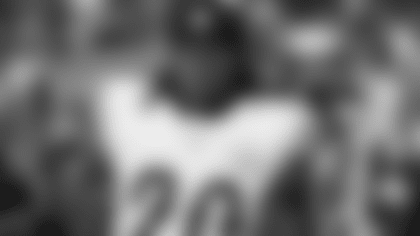**
Q. When you prepare the team for a particular opponent, how do you deal with the possible perception by your players that the opponent is inferior?**
A. Part of the scouting report, part of the introductory phase of a game plan is to shape that perception, and to shape that perception in a way that's conducive for us being prepared to play. That's what I do. I talk about the things that could derail our intentions, talk about the things that we need to minimize, talk about the strengths of a particular opponent. That's part of our challenge this week. Jacksonville is an 0-4 football team, but they have a very good and deep defensive front. They're second in the league in sacks, and for an 0-4 team to be second in the league in sacks that speaks to the strength of the defensive line unit. We have to work to minimize that unit's impact on the game. Those are the things we focus on, rather than the things that maybe have produced a team's negative record.
Q. Do you find that your players are keeping up with what's going on throughout the league, which teams are playing well, which teams aren't, things of that nature?
A. They keep up with it from a conversational standpoint. In terms of game-planning and the intimate details that you need to put together a game plan, I believe they come in every Wednesday ready to receive that information.
Q. In describing your job, you said, "It's my job to be what my team needs me to be. Sometimes it's close and cuddly, sometimes it's not." When you're not close and cuddly, what is it that usually has set you off?
A. Self-inflicted wounds, adversity produced by us, things that we have complete control over that don't unfold in the manner in which we like. There's enough that goes on in stadiums and in competitive situations that you have little or no control over that you need to combat, and then when you need to combat things created by you, that touches me.
**
Q. How would you describe the young professional athlete of today?**
A. I think they're highly motivated, driven. They have access to information they utilize. The way technology is being infused into preparation is a big part of today's game, and these guys are really in tune and searching for the cutting edge things that allow them to be the best they can be. Whether it's preparation from an audio-visual or technical standpoint, or whether it's the way they train their bodies over a 12-month calendar, or what it is they put in their bodies. They're more informed than generations in the past with regard to those things, and I think it helps them. It makes our game more competitive. I think it makes it more challenging.
Q. A slang term hung on young people is to refer to them as the "me generation." Do you find that to be true at all?
A. I don't see that unfold in their work. There's the potential for less camaraderie and interaction than there was in the past, but technology plays into that. It's their ability to gain access to information on their phones, and in situations where they didn't have an opportunity to communicate with people in the past, or to gain information from the outside in the past, it's now readily available at their fingertips. So, bus rides and so forth where guys would be telling jokes in the past, often times now you'll see guys surfing the internet. But I don't think that unfolds in any way in regards to their work, or in how they interact in their work or in a professional setting.
Q. A lot of players are involved with charities. Is that involvement something that goes through you?
A. I think it's important that they find something to get involved in. It's important that they become aware of their place in our community and how they can be a positive contributor to our community. What specifically it is they do – I'm hoping they find that. With our young guys we do things collectively and thoughtfully in terms of introducing them to various activities around the city that might be worthy endeavors. As they graduate out of that program, I hope they find something that moves them personally. The way Brett Keisel found something with Children's Hospital, the way Will Gay found something with the Abuse Center. That's my hope and my goal. We direct them. We want them to become aware of the power they hold and how they need to use it for good. But hopefully it's something that moves them as individuals.
Q. How do you fix the lack of consistency?
A. We just continue to roll the ball out during the course of the week when no one's looking and continue to practice with urgency and an edge. I thought we had a good week in that regard. Usually, those things turn up inside the white lines on Sundays.
Q. Does the fact that the Jacksonville Jaguars are 0-4 mean anything to today's game?
A. Not to us. It hadn't dictated anything in terms of our level of preparation or what we need to do to play winning ball. We mean that when we say: it's less about who we play and more about how we play. And that's how we focus our energies.
Q. Is defensive tackle Sen'Derrick Marks the best player on the Jacksonville defense?
A. Not only on defense, but for their whole team. He's the best player on their best unit, which is the defensive line. They have talent and depth along the defensive line. The Jaguars are an 0-4 team and they're second in the league in sacks, and to put that in perspective, 0-4 football teams don't get a lot of clean opportunities to rush the passer. So that speaks to Marks and the work that the defensive line is doing.






